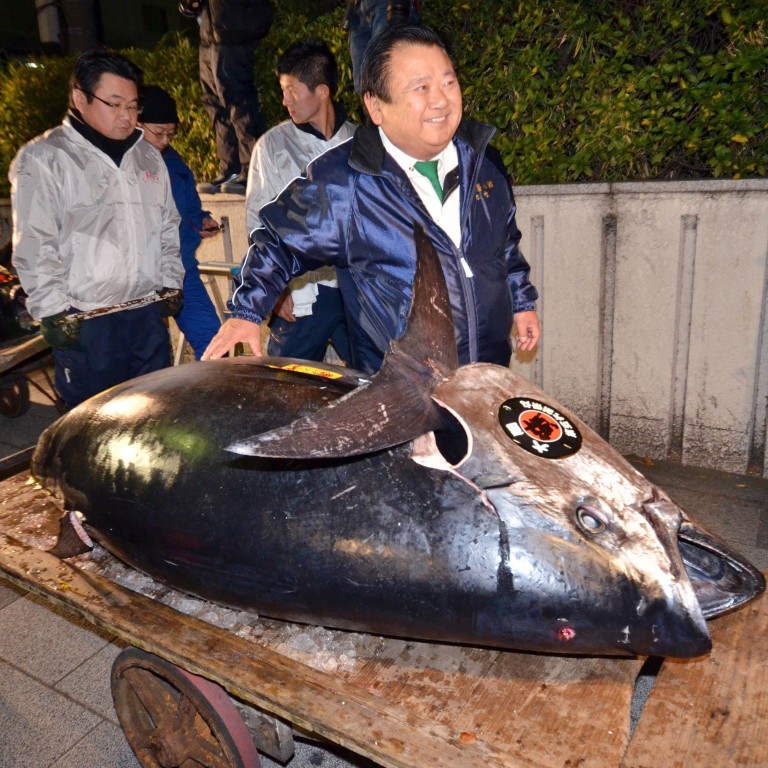
Bluefin tuna goes for a song at Tokyo auction; Hong Kong unlikely to benefit
The cost of bluefin tuna at the year's first auction in Tokyo's Tsukiji fish market declined compared to 2013, despite deep concerns over the sustainability of stocks
A giant bluefin tuna sold at auction in Japan yesterday for about 95 per cent less than the record-breaking sum paid last year - but Hong Kong diners are unlikely to see too steep a drop in prices for the delicacy.
The 230kg fish was purchased at the Tsukiji market's first auction of the year for 7.36 million yen (HK$545,000), significantly lower than the 155.4 million yen paid for a fish of similar quality in 2013. It is the first time in five years that the auction price has slipped below 10 million yen.
Bluefin is usually the most expensive fish available at Tsukiji, the biggest fish and wholesale seafood market in the world.
Intense bidding last year sent prices skyrocketing and deterred other bidders from vying with the popular Sushi-Zanmai restaurant chain.
The same chain won this year's auction. Kiyoshi Kimura, whose Kiyomura Company operates the restaurants, said: "I'm glad that the congratulatory price for this year's bid went back to being reasonable."
The rival Hong Kong-linked Itamae-Sushi chain was top bidder for the biggest bluefin four years in a row until 2012. Founder Ricky Cheng Wai-tao famously became the first non-Japanese to claim top prize at the annual auction after he forked out HK$430,000 for a bluefin in 2008. His last winning bid, in 2011, was for a record HK$3 million bluefin weighing 342kg.
Watch: Bluefin tuna prices sink at auction
Cheng could not be reached for comment yesterday.
Federation of Restaurants & Related Trades President Simon Wong Ka-wo said the lower auction price would not signify too much of a drop in bluefin tuna prices at local restaurants.
"Bluefin tuna is generally priced very high and not that many people can afford it, so retail prices are not likely to be affected too much," he said.
Jackel Lui, who manages a high-end Japanese restaurant in Hong Kong, agreed.
"Previous 'sky high' bids for tuna in Japan were just public relations gimmicks. They did not reflect the true market prices for bluefin tuna," he said.
Lui said many restaurants in Hong Kong did not have bluefin tuna on their menus any more and instead were sourcing the less endangered yellowfin, farmed tunas or tunas from other parts of the world such as the Philippines or the United States.
Chamber of Seafood Merchants Chairman Lee Choi-wah said the low figure could signify weakness in the Japanese seafood export industry, a weaker yen and worries about declining global stocks of bluefin tuna.
Part of this year's price decline was also in part due to the greater number of bluefins available from Oma, the city in northern Japan that is a top site for tuna fishing.
Decades of overfishing have seen global tuna stocks crash, leading some Western nations to call for a ban on catching endangered Atlantic bluefin tuna.
"The population has effectively been decimated," said Amanda Nickson, director for global tuna conservation for The Pew Environment Group. "Over 90 per cent of bluefin tuna are caught before they reach reproductive age. You have to wonder if this is remotely sustainable."


